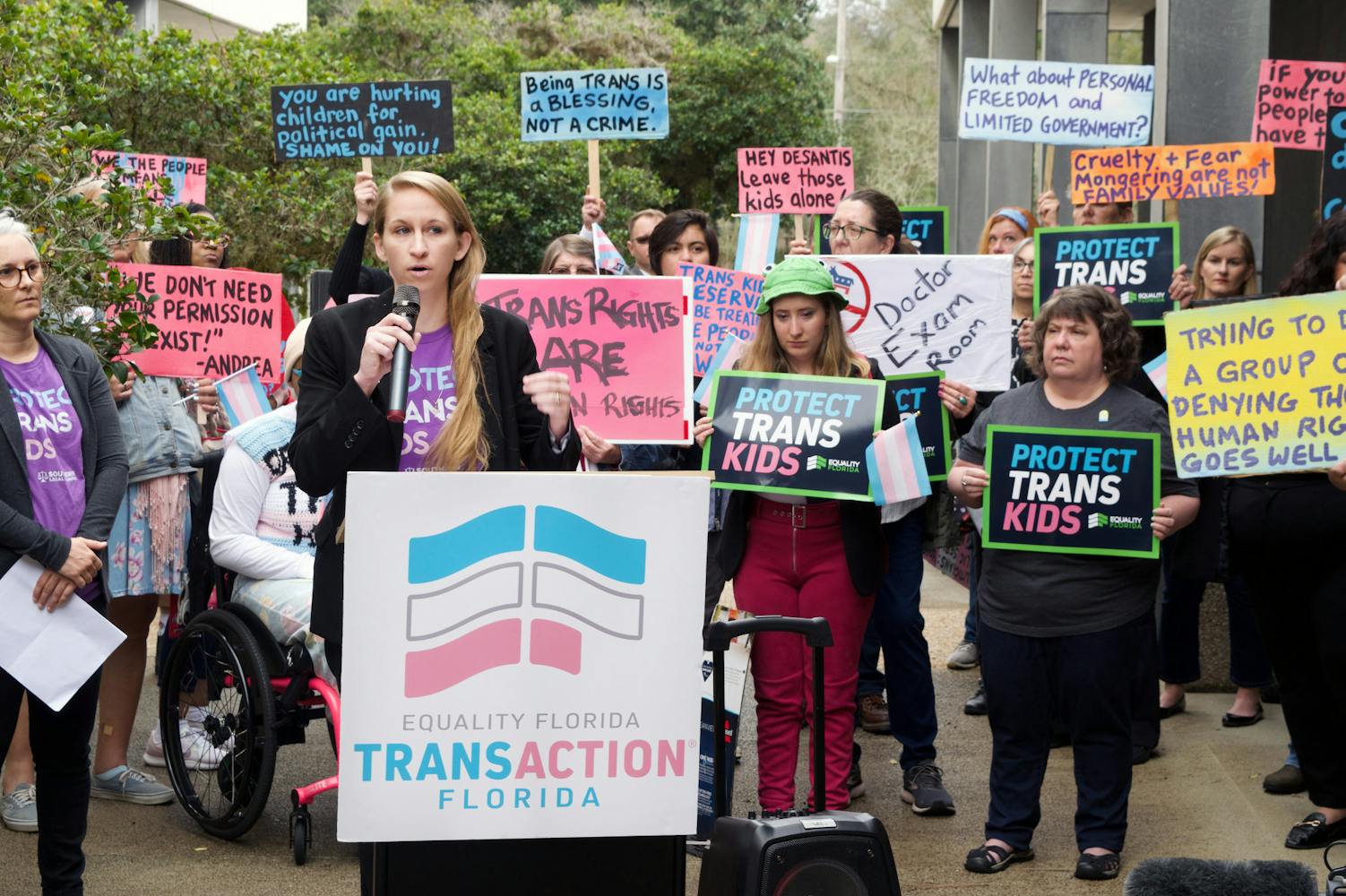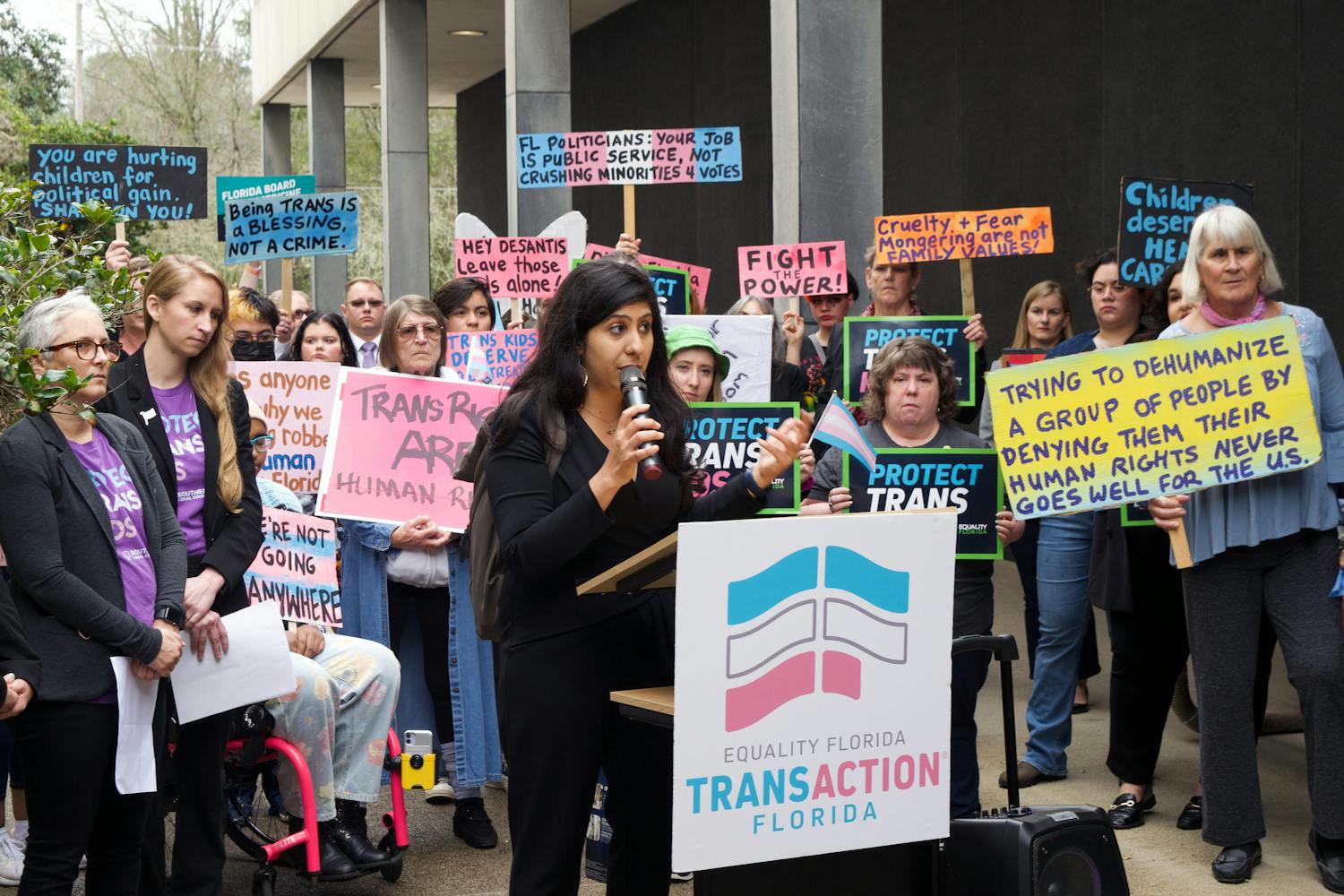Police escorted about 100 supporters of the transgender community out of the Department of Transportation Auditorium in Tallahassee Feb. 10, some leaving without the rights they had only hours prior.
While filing out in compliance with police, the crowd infused the room with chants of “What do we do? Stand up, fight back!”
The tension erupted after the Florida Boards of Medicine and Osteopathic Medicine voted Friday to preserve rules prohibiting doctors in Florida from providing gender-affirming care to trans minors. This includes sexual reassignment surgeries, puberty blockers or hormone replacement therapy.
Patients already receiving gender-affirming care will continue treatment, however.
At the meeting was UF alum Simone Chriss, a civil rights attorney and director of Transgender Rights Initiative at Southern Legal Counsel.
“I have to push back on that notion that this is in any way protecting children,” Chriss said to the board. “Because if that were the case and you all thought that these treatments genuinely were so harmful and damaging, why would there be a clause allowing kids already on this treatment to continue to receive said treatment?”
Before the ban, UF Health served as an oasis for gender-affirming health care through its Youth Gender Program.
Because many multidisciplinary gender health clinics around the state stopped receiving new patients or closed entirely, UF Health was already under strain. Now, if doctors treat new patients, they risk losing their medical licenses when the ban goes into effect.
The Board of Osteopathic Medicine also voted to remove an exemption for research on gender-affirming care, which at the time the Board of Medicine had already removed. The general counsel of the Florida Department of Health, John Wilson, recommended it is “unnecessarily confusing” that both boards don’t have the same rules.
This means transgender youth under 18 will be unable to receive nonsurgical gender-affirming care in clinical trials. It also means research institutions like UF can’t conduct clinical trials on gender-affirming care.
The boards didn’t state when the ban will go into effect at the time of the meeting.
In the audience was Florida House Representative, Anna Eskamani, D-Orlando. For Eskamani, the new rules should be discarded altogether, but to remove the research exemption would be counterintuitive.
“The notion that we can’t even do research… is really frustrating,” Eskamani said to the boards. “One of the themes that we keep hearing from everyone here is you need more research. And so at the very least, let’s allow there to be the clinical trials, so we have more research, and we can save lives.”
The decision was not just based on the lack of research, board member Hector Vila said, but on the permanence of gender-affirming care.
“This board is not against research, it is not against care for transgender children,” Vila said. “What the board has sought to do, is to protect our children from therapies that have irreversible harm.”
The event of detransition is very rare, however. A 2022 Netherlands study found that 98% of people who started gender-affirming care during adolescence continued their treatment.
The other state legislator present was Rep. Rita Harris, D-Orlando.When she took the podium, she listed 20 institutions that endorse gender-affirming care, including the American Academy of Family Physicians and the American Academy of Pediatrics.
“That’s quite a group of people to go against,” Harris said. “They’ve weighed in, and this is what they’ve said: Gender-affirming care saves lives.”
Doctors, lawyers, students, transgender activists and parents of transgender children also voiced their disapproval of the board’s decision in over two hours of public comment.
When most of the speakers rose to advocate for gender-affirming care, the audience snapped in applause or waved little pink-and-blue transgender flags in unison. Others donned transgender flags as capes and carried signs to show their support.
Sebastian Cook, who is transgender, stressed the importance of gender-affirming care to the board.
“Three times, I tried to kill myself because I could not stand living in this body I was born in and I did not have the resources to help me,” Cook said. “Gender-affirming health care saved my life… If you want to see trans children grow up to be adults, then you need to let them have access to the care that’s going to keep them alive.”
After undergoing gender-affirming surgeries, trans people receive a 42% reduction in psychological distress and a 44% reduction in suicidal tendencies, according to a Harvard T.H Chan School of Public Health study.
UF Health Clinical Psychologist Jennifer Evans said the board’s decision doesn’t align with the existing research.
“It’s incredibly important that patients, their parents and doctors be the ones to make the decisions about if and when to start medical treatments,” Evans said before the meeting. “Medical providers with expertise in this area have already determined that the benefits of these medications far outweigh the risks.”
Many in support of the transgender community predicted the outcome, stating politics as the motivation for the boards’ decision, whose members are appointed by the governor.
Jen Cousins, the mother of a trans child and co-founder of the non-profit educational organization, Florida Freedom to Read Project, said the ban is government overreach.
“The state needs to stop putting politics over healthcare and let our children grow up to be happy, healthy adults and future leaders of our society,” Cousins said.
Contact Jack Lemnus at jlemnus@alligator.org. Follow him on Twitter @JackLemnus.
Jack Lemnus is a fourth-year journalism major and rural Alachua reporter. He loves to practice his Spanish, fill his bookshelves and gatekeep what he considers underground music.









